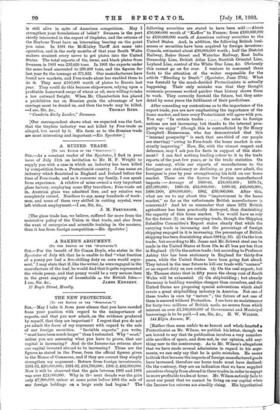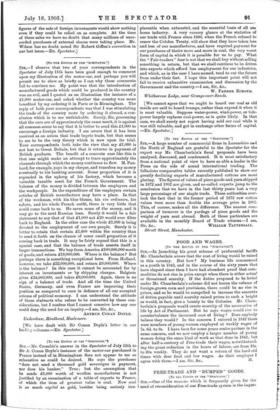THE NEW PROTECTION.
[TO THE EDITOR OP THE "SPECTATOR."'
Sin,—May I take it from your silence that you have receded from your position with regard to the unimportance of exports, and that you now admit, on the evidence produced by myself, that they are important? I regret that you do not yet admit the force of my argument with regard to the sale of our foreign securities. "Invisible exports," you write, "must have been much larger" than I estimated. Why "must," unless you are assuming what you have to prove, that our capital is increasing? And do the Income-tax returns show our capital invested abroad to be increasing? These are the figures is stated in the Press, from the official figures given in the House of Commons, and if they are correct they simply strengthen my argument : Return from foreign investments, 1881-82, £30,000,000; 1891-92, £54,700,000; 1901-2, 262,000,000. Now it will be observed that the gain between 1881 and 1891 was over 224,000,000. Why in tin next decade was the gain only 27,300,000, unless at some point before 1901 the sale of our foreign holdings on a large scale had begun ? The following securities are , stated to have been sold :—About 250,000,000 worth of "Kaffirs" to France; from 2100,006,00Q to £150,000,000 worth of American railway securities to the United States. And, in addition, the following British busi- nesses or securities have been acquired by foreign investors : Consols, estimated about 230,000,000 worth ; half the District Railway, Baker Street and Waterloo Railway, East India Steamship Line, British Atlas Line, Scottish Oriental Line, Leyland Line, control of the White Star Line, &c. Obviously this cannot go on for ever. I venture to commend these facts to the attention of the writer responsible for the article "Bleeding to Death" (Spectator, June 27th). What was foretold by the much-derided Protectionists is actually happening. Their only mistake was that they thought economic processes worked quicker than history shows them to work. They correctly foretold the future, but they ante- dated by some years the fulfilment of their predictions.
After conceding my contentions as to the importance of the export trade, you are now emphasising the importance of the home market, and here every Protectionist will agree with you.
You say : "In certain trades the sales to foreign nations are not increasing, but thanks to the internal pros- perity we enjoy" (though this is contradicted by Sir Henry Campbell - Bannerman, who has demonstrated that this "internal prosperity" is such that one-third of our people are starving) "owing to Free-trade the home market is con- stantly improving." Now, Sir, with the utmost respect and deference, may I ask you for facts in support of this state- ment? I can find nothing lending colour to it in the trade reports of the past few years, or in the trade statistics. On the contrary, while our exports of manufactures to the foreigner are stationary or declining, as you now admit, the foreigner is year by year strengthening his hold on our home market. These are the figures for foreign manufactured imports :— Average of 1860-64, £18,000,000; 1870-74, £37,000,000; 1880-84, £55,000,000; 1890-93, 265,000,000; 1898-1900, £90,000,000; 1902,, '09,000,000. After this, what are we to say about this "improvement in the home market," so far as the unfortunate British manufacturer is concerned? And let us remember that since 1872 British agriculture has been practically destroyed, thus diminishing the capacity of this home market. You would have us rely for the future (1) on the carrying trade, though the Shipping Subsidies Committee's Report states clearly that while the carrying trade is increasing and the percentage of foreign shipping engaged in it is increasing, the percentage of British shipping has been diminishing since 1894(j). 16). (2) On the iron trade; but according to Mr. Jeans and Mr. Schwab steel can be made in the United States at from 15s. to 21 less per ton than in England. (3) On the cotton trade ; but according to Professor Ashley this has been stationary in England for thirty-five years, while the United States have been going fast ahead. They intend in the near future to kill our trade with "corners" or an export-duty on raw cotton. (4) On the coal export; but Mr. Thomas states that in fifty years the cheap coal of South Wales will be exhausted. (5) On shipbuilding ; but already Germany is building warships cheaper than ourselves, and the United States are proposing special subventions which shall create a great shipbuilding industry in America. Not one of these trades is ours by " nature " ; the future of not one of them is assured without Protection. I see here no maintenance for forty-two millions of British souls, no source from which interest on over 21,100,000,000 of Government and Municipal borrowings is to be paid.—I am, Sir, 4c., H. W. WiLsoN.
144 Elgin Avenue, W.
[Rather than seem unfair to so honest and whole-hearted a Protectionist as Mr. Wilson, we publish his letter, though we are bound to say that its publication involves a very consider- able sacrifice of space, and does not, in our opinion, add any- thing new to the controversy. As to Mr. Wilson's allegations that we have made several admissions in regard to his argu- ments, we can only say that he is quite mistaken. He seems to think that because the imports of foreign manufactured goods have increased, therefore our home trade must have declined. On the contrary, they are an indication that we have supplied ourselves cheaply from abroad in these trades in order to engage in more profitable trades at home. Mr. Wilson entirely fails to meet our point that we cannot be living on our capital when the Income-tax returns are steadily rising. His hypothetical figures of the sale of foreign investments would show nothing even if they could be relied on as complete. At the time of these sales we have no doubt that many millions of unre- corded purchases of external shares were taking place. Mr. Wilson has no doubt noted Sir Robert Giffen's correction in our last issue.—En. Spectator.]











































 Previous page
Previous page